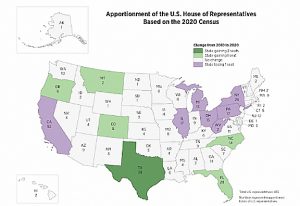Immediate reactions from the republicans are beer parties while the democrats cringe in dark corners. But it isn’t that simple. The census actually has several stories to tell.

- There is a real chance that republicans will overtake democrats in 2022 and even in 2024. Certainly the House of Representatives has a better than even chance to go republican in 2022. The combination of a significant majority of republican state legislatures plus the irrationality of the Electoral College plus the adjustments in gerrymandering to leverage the census figures, do not bode well for democrats in the short term.
- Globally, human population is dropping. The top 30 nations, which includes China and the United States, are not producing offspring as rapidly as they need to sustain population levels. Japan has serious issues; its population has been dropping for several years at an average of .3 percent. Japan’s GDP is at risk of failing in the next decade.
- It may be confusing to say that the US has declining population given the census count which shows an increase of 1.5m or ½ of 1 percent. One TV pundit put it straight forward. The increase is immigrants, black, brown and Asian. He surmised that Texas will be a purple state by 2028. He further suggested that the republican states – particularly southern ones – will suffer the Georgia syndrome because northern liberals are moving south.
- Setting aside population growth supported by migration, the indigenous US population (meaning everyone who lived in the country in 2010, has in fact dropped. Most notably is the Caucasian percentage. The new statistics project that the nation will become “minority white” in 2045. The shift is the result of two trends. First, between 2018 and 2060, gains will continue in the combined racial minority populations, growing by 74 percent. Second, during this time frame, the aging white population will see a modest immediate gain through 2024, and then experience a long-term decline through 2060, a consequence of more deaths than births.
- Already poking its nose above the horizon through intense weather is climate change. Rising sea levels and agricultural hardship are expected to have a growing impact on all coasts of the United States; by the end of the century the Earth’s seas will be one foot higher than today. Forced migration will start much sooner, affecting future census data.
From a different perspective, today’s cultural and economic progress has difficulty adjusting as the US moves through its national history. Progress is difficult because the US Constitution is the same one created in the 18th century: a democratic Federal Republic designed to govern a scarcely populated citizenry across an unknown continent. Automobiles, electricity, computers and an unanticipated population density call for consideration of a Constitutional convention. But who dares?!
Ancient Mariner
